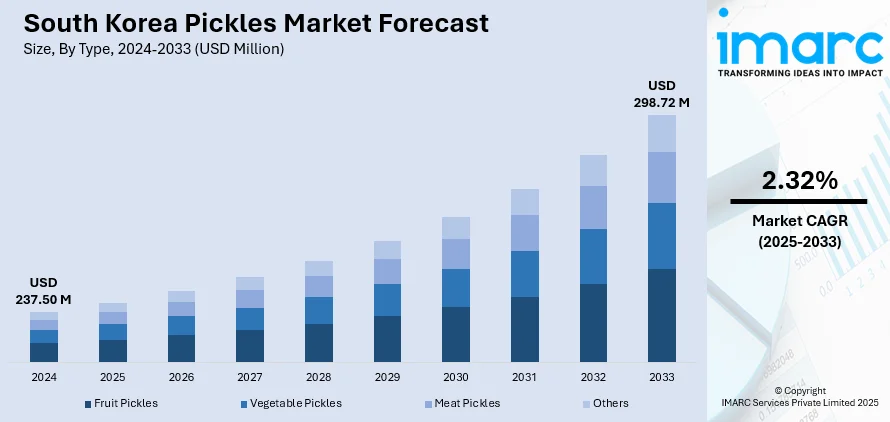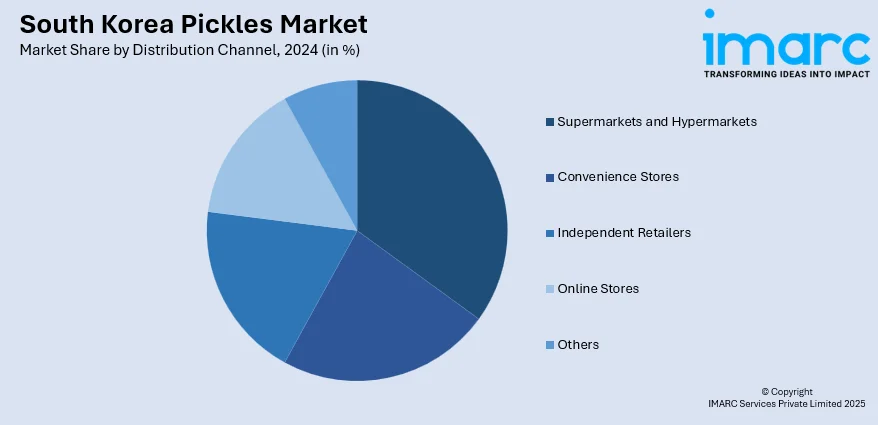
South Korea Pickles Market Size, Share, Trends and Forecast by Type, Taste, Distribution Channel and Region, 2025-2033
South Korea Pickles Market Overview:
The South Korea pickles market size reached USD 237.50 Million in 2024. Looking forward, the market is expected to reach USD 298.72 Million by 2033, exhibiting a growth rate (CAGR) of 2.32% during 2025-2033. The market is fueled by deep cultural dependence on fermented foods, particularly kimchi, which is a staple in every meal. Increased health consciousness around probiotics and gut health is driving demand for naturally fermented pickles. Innovation across ready-to-eat and single-serve packaging is attracting busy city-dwelling consumers. Growing demand for traditional and regional pickling practices is also gaining interest from young consumers who are interested in seeking authenticity and flavor diversity, which further contributes to the growth in South Korea pickles market share.
|
Report Attribute
|
Key Statistics
|
|---|---|
|
Base Year
|
2024 |
|
Forecast Years
|
2025-2033
|
|
Historical Years
|
2019-2024
|
| Market Size in 2024 | USD 237.50 Million |
| Market Forecast in 2033 | USD 298.72 Million |
| Market Growth Rate 2025-2033 | 2.32% |
South Korea Pickles Market Trends:
Traditional Kimchi and Fusion Pickle Revival
South Korea's market for pickles is experiencing a revival based on an enhanced appreciation of the old fermentation methods, particularly around kimchi and other traditional fermentations. Although kimchi is still the symbolic Korean pickle, increased interest is being experienced in local variants such as gangjeong jangajji and dongchimi, each with unique flavor profiles attached to local ingredients, from radish through napa cabbage. With contemporary consumers demanding authenticity as well as novelty, old-fashioned pickles are being reinterpreted. Artisanal makers and small-batch fermenters are adding modern twists to heritage recipes—juicing indigenous fruits such as Asian pear or Korean quince into brining blends to create a subtle mix of sweetness and pungency. Such fusion pickles retain comforting flavors yet pique adventurous palates. Meanwhile, local chefs and culinary schools are promoting domestic pickling traditions at food festivals and workshops, further spurring public interest. In the cities, young food innovators are combining kimchi and jangajji with international cuisines—from tacos and sandwiches to pasta—spurring cross-cultural foods that honor changing Korean tastes while being true to heritage flavors. This revival combines ancient traditions with contemporary creativity, and hence pickles have a prominent, dynamic position in South Korea's food culture and retail environment. This factor further contributes to the increased demand along with South Korea pickles market growth and development.

To get more information on this market, Request Sample
Premiumization and Healthy Product Innovation
Health and wellbeing practices are transforming South Korea's pickles market as customers increasingly demand functional foods that feed the gut, enhance immunity, and support longevity. With centuries of fermentation knowledge built into traditional Korean cuisine, pickles—most notably kimchi—are being reimagined with new health messages, including enhanced probiotic qualities and low-sodium options. Brands are getting creative with value-added ingredients, incorporating indigenous superfood vegetables such as perilla leaves and bamboo shoots to increase antioxidant levels and compete for health-conscious consumers. Domestic players are highlighting fermentation time, employing slow, controlled methods that activate umami and functional characteristics. Packing innovations mirror this trend as well, where vacuum-sealed containers, cold-chain transport, and single-serve small-portion packs are speeding product convenience and freshness. This trend of premiumization is also supported by food professionals who call out the nutritional narrative behind products. Essentially, pickles in South Korea are now being adapted beyond being a side dish to be a thoughtful, health-focused shelf stock item in terms of pantry staples for contemporary homes.
Convenience, Ready-to-Eat Formats, and Export Expansion
South Korea's fast-paced lifestyle has fueled a transition in consumer taste toward convenience without sacrificing tradition, which has compelled the pickles market to become innovative, and ready-to-consume. Supermarkets, convenience stores, and internet retailers now have single-serve sachets of kimchi, pouch-type jangajji, and portion-controlled pickles designed for lunchboxes, quick bites, or one-person households. Vacuum-sealed packs provide shelf stability and convenience, while meal-kit partnerships with kimchi or pickle combinations make it convenient for busy urban consumers to enjoy fermented side dishes. The formats also appeal to younger singles in apartments, who value convenience yet want familiar flavors. Meanwhile, export-oriented makers are packaging pickles in high-end glass containers and biodegradable packaging to cater to global demand. Korean pickles, particularly artisan kimchi and jangajji, are becoming increasingly popular abroad, fueled by the world's love for K-Food. North American, European, and Southeast Asian importers are stocking high-end kimchi brands, along with other Korean condiments, due to increasing popularity of fermented foods and gut health topics. This export drive inspires domestic companies to improve product quality, brand, and packaging design. The collaboration between export orientation and convenience innovation highlights the dynamism and resilience of South Korea's pickles industry, making pickles relevant for domestic and international use throughout the 21st century.
South Korea Pickles Market Segmentation:
IMARC Group provides an analysis of the key trends in each segment of the market, along with forecasts at the country and regional levels for 2025-2033. Our report has categorized the market based on type, taste, and distribution channel.
Type Insights:
- Fruit Pickles
- Vegetable Pickles
- Meat Pickles
- Others
The report has provided a detailed breakup and analysis of the market based on the type. This includes fruit pickles, vegetable pickles, meat pickles, and others.
Taste Insights:
- Sweet Pickles
- Salty Pickles
- Sour Pickles
The report has provided a detailed breakup and analysis of the market based on the taste. This includes sweet pickles, salty pickles, and sour pickles.
Distribution Channel Insights:

- Supermarkets and Hypermarkets
- Convenience Stores
- Independent Retailers
- Online Stores
- Others
A detailed breakup and analysis of the market based on the distribution channel has also been provided in the report. This includes supermarkets and hypermarkets, convenience stores, independent retailers, online stores, and others.
Regional Insights:
- Seoul Capital Area
- Yeongnam (Southeastern Region)
- Honam (Southwestern Region)
- Hoseo (Central Region)
- Others
The report has also provided a comprehensive analysis of all the major regional markets, which include Seoul Capital Area, Yeongnam (Southeastern Region), Honam (Southwestern Region), Hoseo (Central Region), and others.
Competitive Landscape:
The market research report has also provided a comprehensive analysis of the competitive landscape. Competitive analysis such as market structure, key player positioning, top winning strategies, competitive dashboard, and company evaluation quadrant has been covered in the report. Also, detailed profiles of all major companies have been provided.
South Korea Pickles Market Report Coverage:
| Report Features | Details |
|---|---|
| Base Year of the Analysis | 2024 |
| Historical Period | 2019-2024 |
| Forecast Period | 2025-2033 |
| Units | Million USD |
| Scope of the Report | Exploration of Historical Trends and Market Outlook, Industry Catalysts and Challenges, Segment-Wise Historical and Future Market Assessment:
|
| Types Covered | Fruit Pickles, Vegetable Pickles, Meat Pickles, Others |
| Tastes Covered | Sweet Pickles, Salty Pickles, Sour Pickles |
| Distribution Channels Covered | Supermarkets and Hypermarkets, Convenience Stores, Independent Retailers, Online Stores, Others |
| Regions Covered | Seoul Capital Area, Yeongnam (Southeastern Region), Honam (Southwestern Region), Hoseo (Central Region), Others |
| Customization Scope | 10% Free Customization |
| Post-Sale Analyst Support | 10-12 Weeks |
| Delivery Format | PDF and Excel through Email (We can also provide the editable version of the report in PPT/Word format on special request) |
Key Questions Answered in This Report:
- How has the South Korea pickles market performed so far and how will it perform in the coming years?
- What is the breakup of the South Korea pickles market on the basis of type?
- What is the breakup of the South Korea pickles market on the basis of taste?
- What is the breakup of the South Korea pickles market on the basis of distribution channel?
- What is the breakup of the South Korea pickles market on the basis of region?
- What are the various stages in the value chain of the South Korea pickles market?
- What are the key driving factors and challenges in the South Korea pickles market?
- What is the structure of the South Korea pickles market and who are the key players?
- What is the degree of competition in the South Korea pickles market?
Key Benefits for Stakeholders:
- IMARC’s industry report offers a comprehensive quantitative analysis of various market segments, historical and current market trends, market forecasts, and dynamics of the South Korea pickles market from 2019-2033.
- The research report provides the latest information on the market drivers, challenges, and opportunities in the South Korea pickles market.
- Porter's five forces analysis assist stakeholders in assessing the impact of new entrants, competitive rivalry, supplier power, buyer power, and the threat of substitution. It helps stakeholders to analyze the level of competition within the South Korea pickles industry and its attractiveness.
- Competitive landscape allows stakeholders to understand their competitive environment and provides an insight into the current positions of key players in the market.
Need more help?
- Speak to our experienced analysts for insights on the current market scenarios.
- Include additional segments and countries to customize the report as per your requirement.
- Gain an unparalleled competitive advantage in your domain by understanding how to utilize the report and positively impacting your operations and revenue.
- For further assistance, please connect with our analysts.
 Request Customization
Request Customization
 Speak to an Analyst
Speak to an Analyst
 Request Brochure
Request Brochure
 Inquire Before Buying
Inquire Before Buying




.webp)




.webp)












